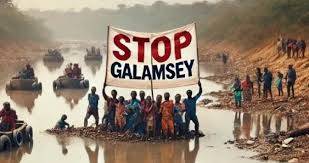Who Stops Galamsey: The People or the President?
Galamsey, the illegal mining of gold and other minerals, has been a significant challenge in Ghana. It poses severe environmental risks, undermines the rule of law, and affects the livelihoods of many communities. The question of who can effectively halt this practice—local communities or the government—has sparked considerable debate.
The Role of the President
The president of Ghana holds significant power in the fight against galamsey. Successive administrations have recognized the need to curb illegal mining due to its detrimental impact on the environment and economy. The government has implemented various policies, such as a ban on small-scale mining, which was enforced in 2017. The president has also launched initiatives aimed at rehabilitating affected lands and supporting legal mining operations.
However, the effectiveness of presidential action has often been questioned. Critics argue that despite strong rhetoric, enforcement remains weak. Corruption and collusion between illegal miners and local officials undermine government efforts. In many cases, the laws designed to combat galamsey are poorly enforced, leading to a sense of impunity among illegal miners. Thus, while the president has a crucial role, the political will and capacity to act decisively are often lacking.
The Role of the People
On the other hand, local communities are pivotal in the fight against galamsey. They bear the brunt of the environmental degradation caused by illegal mining, which contaminates water sources and destroys arable land. Communities have begun to organize themselves, raising awareness about the dangers of galamsey and advocating for sustainable practices.
Grassroots movements have emerged, mobilizing residents to resist illegal mining activities. Many community leaders are actively involved in educating their peers about the importance of preserving their natural resources. This local activism can sometimes prove more effective than government efforts, as it is driven by the immediate interests of those most affected.
Moreover, community involvement can complement government action. When local residents feel empowered to report illegal activities, it can enhance the effectiveness of government initiatives. A collaborative approach, where communities partner with law enforcement and government bodies, could yield better results than relying solely on presidential decrees.
The Need for a Collaborative Approach
The fight against galamsey requires a multifaceted strategy that combines the efforts of both the president and the people. The government must strengthen its enforcement capabilities, ensuring that laws against illegal mining are applied consistently and transparently. Anti-corruption measures are essential to regain public trust and ensure that officials are held accountable.
At the same time, empowering local communities is crucial. This involves providing them with the resources and training to manage their natural resources sustainably. Community-led initiatives that promote legal mining practices can help transform local economies while safeguarding the environment.
Conclusion
Ultimately, the responsibility for stopping galamsey does not rest solely on the shoulders of the president or the people; it requires a synergistic effort. The government must take a strong stance against illegal mining, while local communities must be empowered to take an active role in protecting their environment. Only through collaboration can Ghana hope to effectively combat the challenges posed by galamsey and secure a sustainable future for its natural resources and its people.


